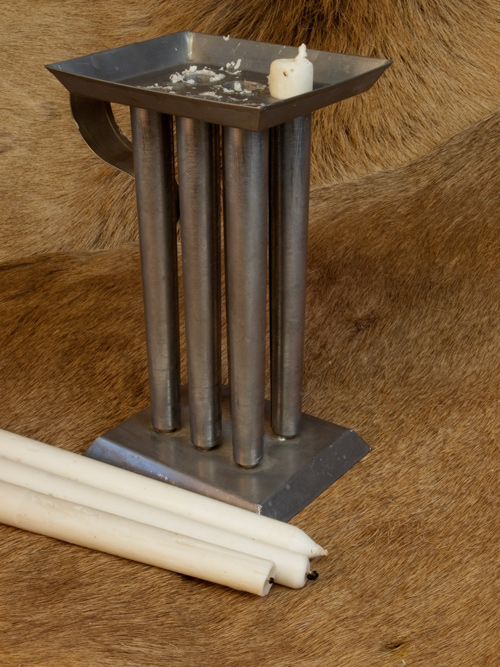Fort Clatsop, Astoria, OR Elk tallow is rendered to make new candles, Lewis finds that the area’s elk do not have enough fat to make a sufficient supply, and President Jefferson writes to Lewis’s mother with news of the expedition’s progress.
Tallow Candles and Mold
© 2011 by Kristopher K. Townsend. Permission to use granted under the Creative Commons Attribution-Share Alike 4.0 International license.
Above: Beef tallow candles and a candle mold on an elk hide. For more on how they made candles at Fort Clatsop, see Making Candles.
Bringing in the Elk[1]Originally aired weekdays by Yellowstone Public Radio during the Bicentennial observance of 2003-2006. Narrated by Hal Hansen. Scripts by Whit Hansen and Ed Jacobson. Produced by Leni Holliman. © … Continue reading
Retrieving Seven Elk
Capt. Lewis and all the party except the guard went after the Elk meat. Six men Set jurking the meat to keep it from Spoiling.
—John Ordwaywe found it in good order being untouched by the wolves, of which indeed there are but few in this country
—Meriwether Lewis
Making Elk Tallow Candles
this evening we exhausted the last four candles, but fortunately had taken the precaution to bring with us moulds and wick, by means of which and some Elk’s tallow in our possession we do not yet consider ourselves destitute of this necessary article; the Elk we have killed have a very small portion of tallow.
—Meriwether Lewis
Trading with Ships
The traders usually arrive in this quarter, as has been before observed, in the month of April, and remain untill October; when here they lay at anchor in a bay within Cape Disappointment on the N. side of the river; here they are visited by the natives in their canoes who run along side and barter their comodities with them The nations who repare thither ar first those of the Sea Coast S. E & N W of the enterance of the river, who reside in the order in which their names are mentioned to the S E. the Clat Sops [Clatsops], Kil-á-mox [Tillamooks], and those to the N W. of the Chin nooks [Chinooks], and Chiltch [Lower Chehalis]; and Secondly the Cath-lâh-mâh [Kathlamets], War-ki-a-cum [Wahkiakums], and Skil-lutes [Skilloots], the latter noumerous and inhabiting [the Cowlitz River], those last [the Cowlitz] may be considered or intermedeate traders between the whites and nations on the Sea Coast, and the E-ne-churs [Teninos], the E-chee-lutes [Wascos and Wishrams], and the Chil-luck-kit-te-quaws [Chilluckittequaws], who inhabit the river up to the great falls inclusive, and who prepare most of the pounded fish which is brought to Market.
The bay in which this trade is carryed on is spacious and commodious, and perfectly secure from all except the S. and S. E. winds, these however are the most prevalent and strong winds in the Winter season. fresh water and wood are very convenient and excellent timber for refiting and reparing vessels.—
—Meriwether Lewis
Respects to Lucy Lewis Marks
Washington Jan. 13. 06.
Dear Sir
A letter from our Indian Agent at St. Louis informs me that some Osage chiefs had just arrived there who assured him that just as they were leaving their nation two Ottos [Otoes] arrived there with a pretty direct account that Capt Lewis & his party had reached that part of the Missouri near the mountains where the Indian tract leads across . . . . in this case I do not expect we shall again hear from him or of him until he gets back to St. Louis . . . . knowing the anxiety of a mother in such a case, I mention this information praying you to present her my respects, & to accept yourself my friendly salutations
Th: Jefferson[2]Jefferson to Reubin Lewis, Letters of the Lewis and Clark Expedition with Related Documents: 1783-1854, 2nd ed., ed. Donald Jackson (Urbana: University of Illinois Press, 1978), 190–91.
Weather Diary
aspect of the weather at rise
Wind at rise
Weather at 4 OC. P.M. Wind at 4 OC. P.M. rain S. W. rain S. W. —Meriwether Lewis[3]To assist the reader, the editor of this web page has omitted the “Day of the month” column and spelled out some of the abbreviations.
Fort Clatsop is a High Potential Historic Site along the Lewis and Clark National Historic Trail managed by the U.S. National Park Service. The site is managed by the Lewis and Clark National and State Historic Parks.
Notes
| ↑1 | Originally aired weekdays by Yellowstone Public Radio during the Bicentennial observance of 2003-2006. Narrated by Hal Hansen. Scripts by Whit Hansen and Ed Jacobson. Produced by Leni Holliman. © 2003 by Yellowstone Public Radio. |
|---|---|
| ↑2 | Jefferson to Reubin Lewis, Letters of the Lewis and Clark Expedition with Related Documents: 1783-1854, 2nd ed., ed. Donald Jackson (Urbana: University of Illinois Press, 1978), 190–91. |
| ↑3 | To assist the reader, the editor of this web page has omitted the “Day of the month” column and spelled out some of the abbreviations. |



